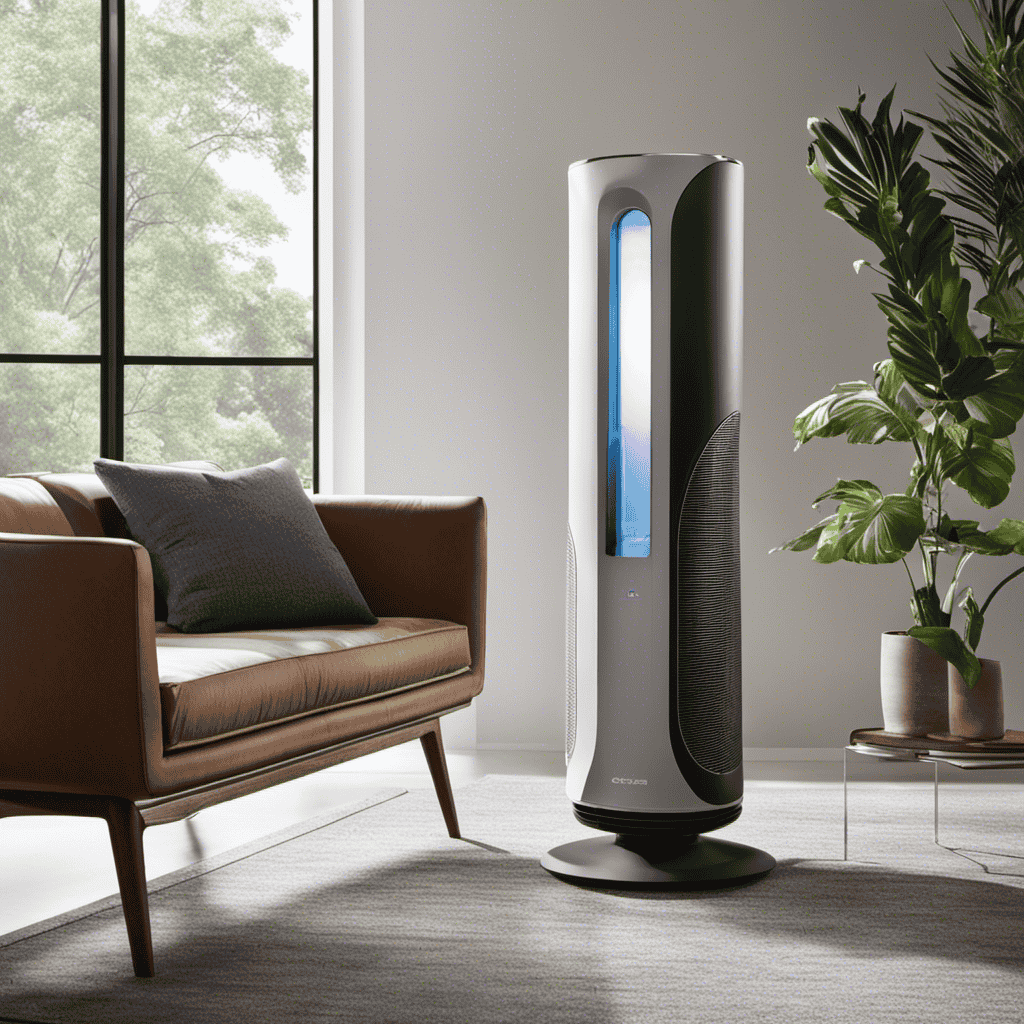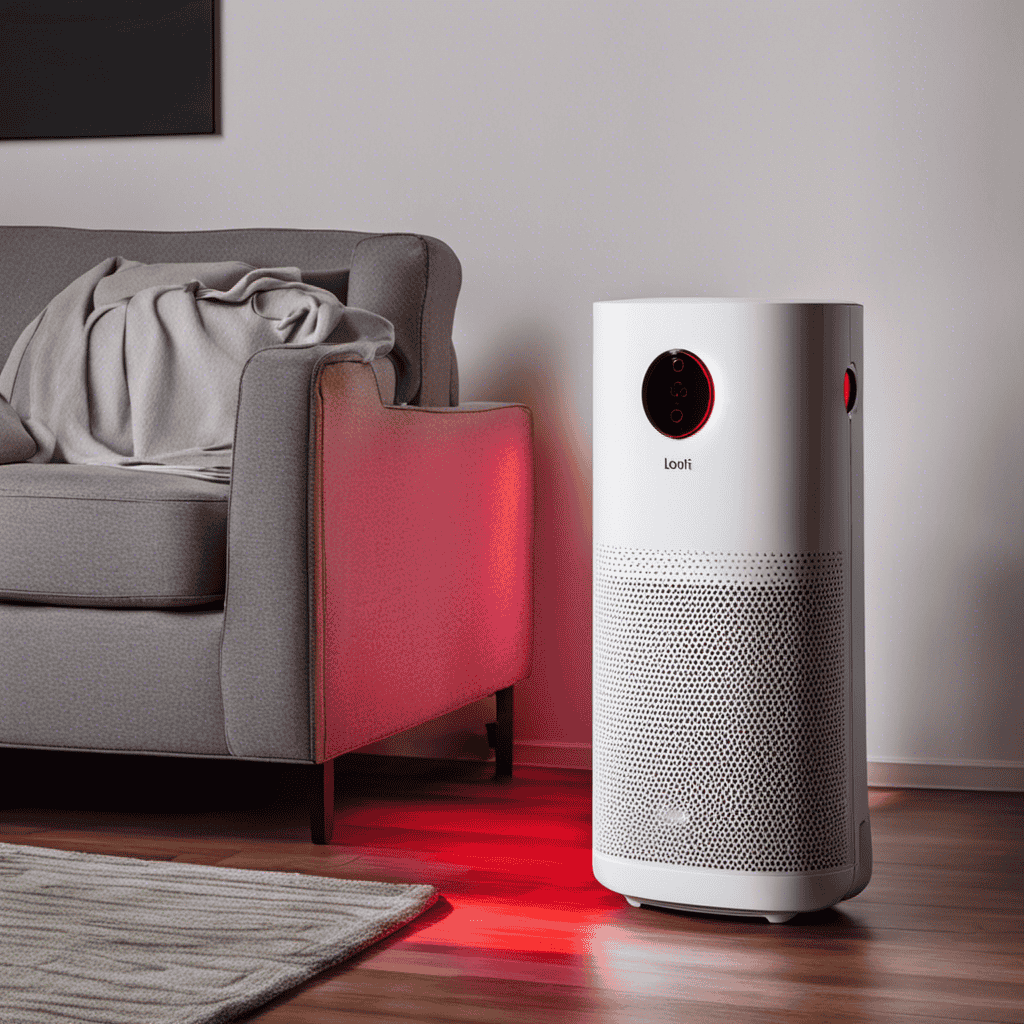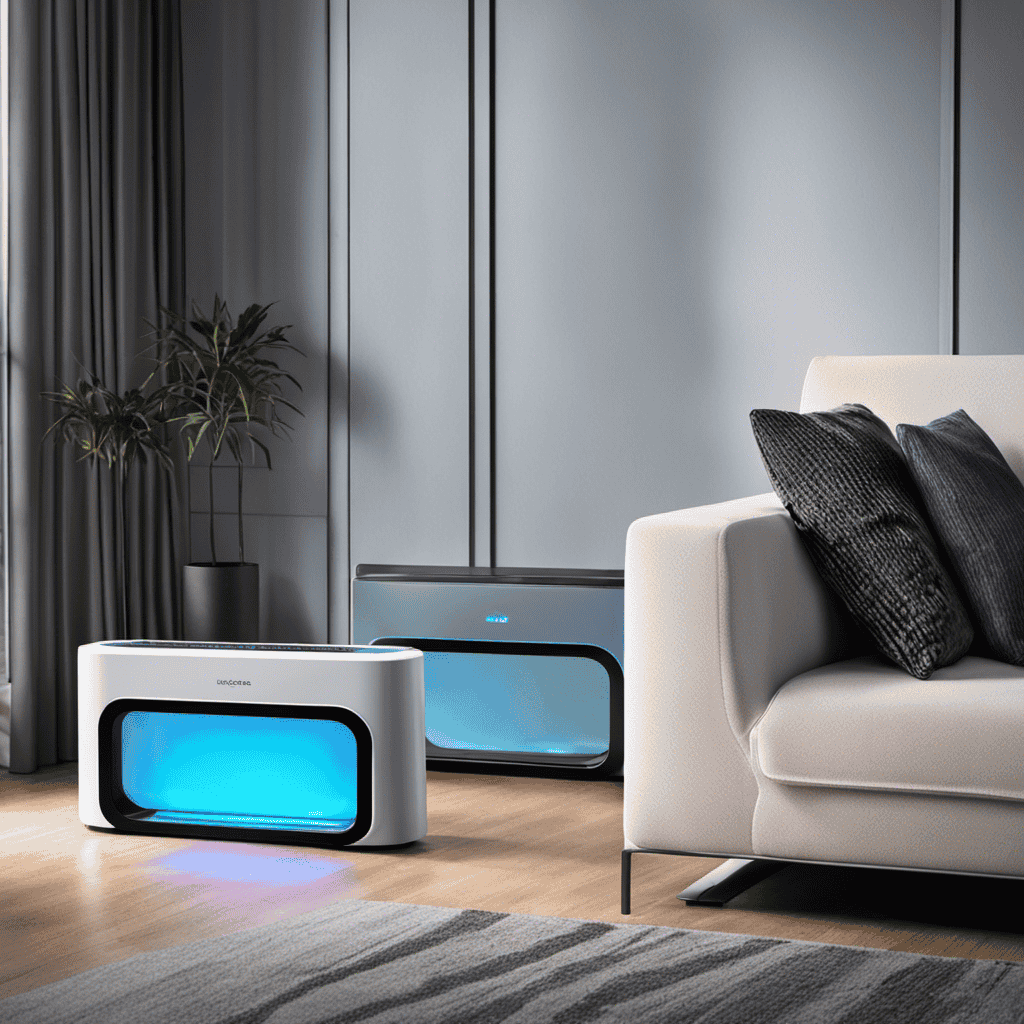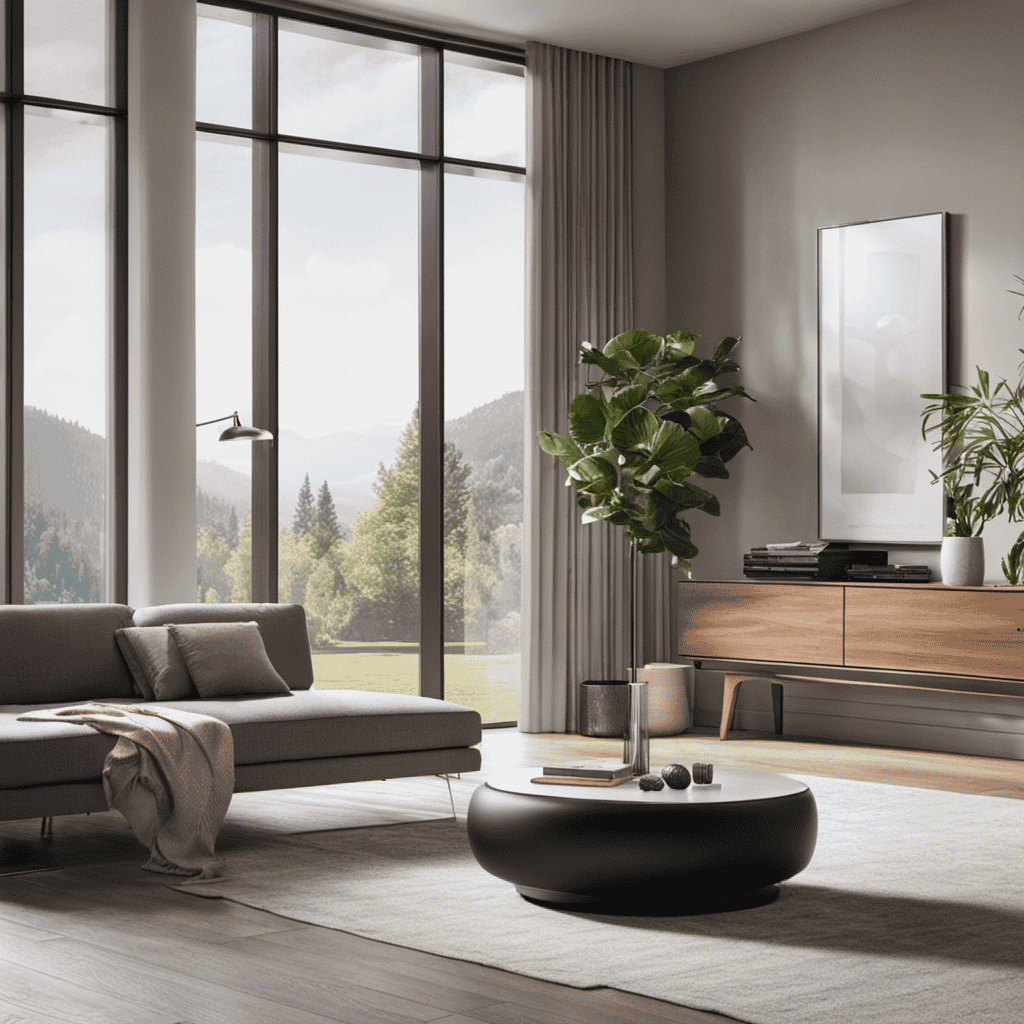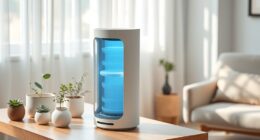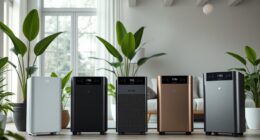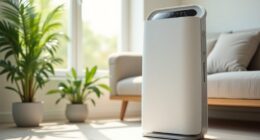As a dedicated researcher in the field of indoor air quality, I can confidently state that air purifiers are truly revolutionary. These cutting-edge devices work tirelessly to eliminate harmful pollutants, allergens, and chemicals from the air we breathe.
Translated into English (United States): As a passionate researcher in the field of indoor air quality, I can confidently say that air purifiers are an absolute game-changer. These innovative devices work tirelessly to remove harmful pollutants, allergens, and chemicals from the air we breathe.
With their advanced filtration systems and cutting-edge technology, air purifiers provide a much-needed respite from the ever-increasing pollution levels in our urban environments.
So, if you’ve ever wondered what an air purifier does, buckle up and get ready to discover the incredible benefits they bring to our homes and workplaces.
Key Takeaways
- Air purifiers remove harmful pollutants, allergens, and chemicals from the air.
- They improve respiratory health by removing airborne particles that trigger allergies and worsen asthma symptoms.
- Air purifiers provide immediate benefits by removing chemicals from the air and preventing the accumulation of toxins in the body.
- Air purifiers effectively remove mold spores from the air, reducing the risk of mold growth.
Understanding the Function of Air Purifiers
To understand the function of air purifiers, you need to know how they work to remove pollutants from the air you breathe. Air purifiers offer numerous benefits, such as improving indoor air quality and reducing the risk of respiratory issues caused by airborne contaminants.
These devices rely on various mechanisms to effectively clean the air. One common mechanism is filtration, where air passes through a filter that captures particles like dust, pollen, and pet dander. Another mechanism is activated carbon absorption, which helps eliminate odors and volatile organic compounds. Some air purifiers also use ionization to charge particles and make them easier to capture.
Understanding these mechanisms allows you to choose the right air purifier for your specific needs and enjoy the benefits of cleaner and healthier air.
How Air Purifiers Improve Indoor Air Quality
Air purifiers can help improve the quality of indoor air by removing allergens and pollutants. These devices offer numerous benefits and come with various features that enhance their effectiveness.
One key benefit of air purifiers is their ability to trap and eliminate common allergens such as pollen, pet dander, and dust mites. They also remove volatile organic compounds (VOCs) and harmful particles like smoke and odors. To achieve these results, air purifiers employ different technologies, including HEPA filters, activated carbon filters, and UV germicidal lamps.
HEPA filters can capture particles as small as 0.3 microns, ensuring that even the tiniest allergens are removed from the air. Additionally, some air purifiers come with smart features like air quality sensors and automatic operation modes, which allow them to adjust their speed and filtration based on the current air quality.
In the next section, we will explore the role of air purifiers in allergen control and how they can help individuals with allergies or asthma.
The Role of Air Purifiers in Allergen Control
If you’re dealing with allergies or asthma, using an air purifier can significantly reduce the presence of allergens in your home. Air purifiers play a crucial role in improving respiratory health by removing airborne particles, such as dust, pollen, pet dander, and mold spores, that can trigger allergies and worsen asthma symptoms.
Here are four key ways in which air purifiers contribute to allergen control:
-
Filtration: Air purifiers use high-efficiency filters to capture and trap allergens, preventing them from circulating in the air you breathe.
-
HEPA Technology: Many air purifiers feature HEPA (High-Efficiency Particulate Air) filters, which can remove up to 99.97% of particles as small as 0.3 microns.
-
Activated Carbon Filters: These filters can effectively absorb and neutralize odors, chemicals, and volatile organic compounds (VOCs) commonly found in indoor environments.
-
Air Exchange Rate: Air purifiers with a high air exchange rate can quickly and efficiently cycle the air in a room, reducing the concentration of allergens.
Removing Dust and Pollen With Air Purifiers
As an expert in indoor air quality, I am excited to discuss the many benefits of air purifiers when it comes to allergy relief.
Studies have shown that air purifiers are highly effective in removing allergens such as dust and pollen from the air, providing much-needed relief for individuals suffering from allergies.
Additionally, air purifiers contribute to improving indoor air quality by reducing the concentration of harmful particles and pollutants, leading to a healthier living environment.
Furthermore, the health benefits of using air purifiers extend beyond allergy relief, as they have been shown to reduce the risk of respiratory illnesses and improve overall respiratory health.
Allergy Relief Benefits
You’ll love how an air purifier helps alleviate your allergies. Here are four reasons why:
-
Indoor Pollution Control: Air purifiers are designed to remove indoor pollutants such as dust, pollen, pet dander, and mold spores from the air. These allergens can trigger allergic reactions, causing symptoms like sneezing, coughing, and itchy eyes. By effectively capturing and filtering these particles, air purifiers can significantly reduce your exposure to allergens inside your home.
-
Air Purifier Effectiveness: Numerous studies have demonstrated the efficacy of air purifiers in improving indoor air quality. For example, a study published in the Journal of Allergy and Clinical Immunology found that using air purifiers reduced airborne allergens by up to 90%. This reduction in allergen levels can lead to a noticeable reduction in allergy symptoms and provide relief for allergy sufferers.
-
HEPA Filtration: Many air purifiers utilize High-Efficiency Particulate Air (HEPA) filters, which are designed to capture particles as small as 0.3 microns in size. This includes most common allergens, ensuring that the air you breathe is free from these triggers. HEPA filters are highly effective and have been proven to remove 99.97% of airborne particles, making them an essential component of any allergy relief strategy.
-
Continuous Allergy Relief: Unlike medications that provide temporary relief, air purifiers offer continuous allergy relief. By running an air purifier in your home, you can maintain a clean and allergen-free environment, reducing the likelihood of experiencing allergy symptoms. This long-term approach can significantly improve your quality of life and allow you to enjoy your home without the constant discomfort of allergies.
Investing in an air purifier is a smart choice for allergy sufferers. With their ability to control indoor pollution and their proven effectiveness, these devices can provide much-needed relief from allergies. Don’t let allergies hold you back. Choose an air purifier and breathe easier today.
Indoor Air Quality Improvement
Improve your indoor air quality by utilizing a high-efficiency particulate air (HEPA) filter. Air purifiers equipped with HEPA filters are designed to remove airborne particles such as dust, pollen, pet dander, and mold spores. These filters have a high capture rate, typically around 99.97%, effectively reducing the concentration of these pollutants in your home. By doing so, HEPA filters can provide numerous benefits for your health and well-being.
Research has shown that using air purifiers with HEPA filters can help alleviate symptoms of allergies and asthma. The filters trap allergens and irritants, preventing them from circulating in the air. This can lead to a significant reduction in sneezing, coughing, and itchy eyes. Additionally, HEPA filters can also remove harmful volatile organic compounds (VOCs) and odors, improving the overall air quality in your home.
Air purifier technology has come a long way in recent years, with advancements in filter design and air circulation systems. Some models even feature smart sensors that detect and adjust the purifier’s settings based on the air quality in your space. This ensures that you are always breathing clean, fresh air.
Investing in an air purifier with a HEPA filter is a proactive step towards creating a healthier indoor environment. With its ability to capture and remove a wide range of pollutants, this technology can greatly benefit your respiratory health and overall well-being.
Health Benefits of Purifiers
Using an air purifier with a HEPA filter can effectively alleviate symptoms of allergies and asthma. Here are four reasons why air purifiers are beneficial and effective:
-
Removes airborne allergens: Air purifiers with HEPA filters can capture and trap common allergens such as pollen, pet dander, and dust mites. This helps reduce allergic reactions and provides relief for individuals with allergies.
-
Eliminates harmful pollutants: Air purifiers can remove harmful pollutants like smoke, volatile organic compounds (VOCs), and mold spores from the air. This improves indoor air quality and reduces the risk of respiratory issues and other health problems.
-
Reduces asthma triggers: By filtering out asthma triggers like dust, pollen, and pet dander, air purifiers can help asthma sufferers breathe easier and reduce the frequency and severity of asthma attacks.
-
Enhances sleep quality: Air purifiers create a cleaner and healthier environment, which can improve sleep quality. Breathing in clean air while sleeping promotes better rest and overall well-being.
Filtering Out Harmful Chemicals With Air Purifiers
Air purifiers can effectively filter out harmful chemicals in the air, providing you with cleaner and healthier indoor air quality. Chemical filtration is an essential feature of air purifiers, as it helps to remove volatile organic compounds (VOCs), formaldehyde, and other toxic substances from the air. Studies have shown that exposure to these chemicals can lead to various health issues, including respiratory problems, allergies, and even cancer.
By using an air purifier with a chemical filtration system, you can significantly reduce your exposure to these harmful substances and improve your overall well-being. Not only do air purifiers provide immediate benefits by removing chemicals from the air, but they also contribute to long-term health benefits by preventing the accumulation of these toxins in your body.
As we transition into the subsequent section about air purifiers and mold prevention, it is important to note that air purifiers can also help in preventing the growth of mold by reducing moisture levels and improving ventilation.
Air Purifiers and Mold Prevention
When it comes to mold prevention, the benefits of using an air purifier cannot be overstated. Studies have shown that air purifiers can effectively remove mold spores from the air, reducing the risk of mold growth and its associated health implications.
In fact, research has shown that exposure to mold can lead to a range of health issues, including respiratory problems, allergies, and even infections.
Mold Prevention Benefits
One of the benefits of an air purifier is that it can help prevent the growth of mold. Mold can be a serious issue in homes, leading to various health risks. Here are four mold prevention techniques that an air purifier can provide:
-
Filtration: Air purifiers are equipped with filters that can remove mold spores from the air, preventing them from settling and growing in your home.
-
Air circulation: By constantly circulating the air in your home, an air purifier can help prevent the stagnant conditions that promote mold growth.
-
Humidity control: Some air purifiers come with built-in humidity sensors and dehumidifiers, which can effectively reduce moisture levels in the air, creating an environment that is less conducive to mold growth.
-
Odor elimination: Mold often produces a musty smell, which can be unpleasant and indicate its presence. Air purifiers can help eliminate these odors, providing a fresh and clean indoor environment.
Air Purifier Effectiveness
To maximize the effectiveness of an air purifier, it’s important to regularly clean and replace the filters. Air purifiers offer numerous benefits, such as improving indoor air quality and reducing the risk of respiratory issues caused by pollutants. The technology behind air purifiers is constantly evolving, with advanced features designed to provide optimal performance. Let’s take a look at a comparison table highlighting the key features of three popular air purifiers on the market:
| Air Purifier Model | Coverage Area | Filtration System | Noise Level |
|---|---|---|---|
| Model A | 500 sq. ft. | HEPA + Carbon | 25 dB |
| Model B | 750 sq. ft. | HEPA + UV-C | 35 dB |
| Model C | 1000 sq. ft. | HEPA + Ionizer | 40 dB |
As you can see, each model offers different coverage areas and filtration systems. Understanding these specifications can help you choose the right air purifier for your needs. Now, let’s explore the health implications of mold and how air purifiers can play a crucial role in mitigating its effects.
Health Implications of Mold
After understanding the effectiveness of air purifiers in removing various airborne pollutants, it is important to consider the health implications of mold. Mold growth not only affects the structural integrity of buildings but also poses serious health risks to individuals exposed to it.
Here are four important points to consider regarding mold prevention techniques and the health risks associated with mold exposure:
-
Moisture control: Eliminating excess moisture in indoor spaces through proper ventilation, dehumidification, and regular maintenance can help prevent mold growth.
-
Proper insulation: Insulating walls, ceilings, and floors can prevent condensation and reduce the chances of mold formation.
-
Effective cleaning: Regularly cleaning and drying areas prone to moisture, such as bathrooms and kitchens, can help prevent mold growth.
-
Health risks: Exposure to mold can lead to respiratory problems, allergies, asthma attacks, and even more severe health conditions in sensitive individuals.
Purifying Indoor Air to Reduce Asthma Symptoms
Using an air purifier can help reduce asthma symptoms by cleaning the indoor air. Research shows that air purifiers are effective in reducing respiratory inflammation and preventing asthma attacks.
When we breathe in polluted air, it can trigger an immune response, leading to inflammation in the respiratory system. This inflammation can cause coughing, wheezing, and shortness of breath, which are common symptoms of asthma.
Air purifiers work by filtering out airborne particles such as dust, pollen, pet dander, and mold spores, which can act as triggers for asthma symptoms. They use a combination of filters, such as HEPA filters, activated carbon filters, and ionizers, to capture and eliminate these particles from the air.
Air Purifiers and Pet Dander Removal
As someone who suffers from pet allergies, I have always been on the lookout for effective solutions to mitigate the symptoms associated with pet dander.
Air purifiers have emerged as a popular choice in this regard, and research suggests that they can be highly beneficial in removing pet allergens from indoor air.
Not only do air purifiers help filter out pet dander, but they also capture other airborne particles such as dust, pollen, and mold spores, making the air cleaner and healthier to breathe.
Pet Allergies and Air Purifiers
If you have pet allergies, an air purifier can help alleviate your symptoms. Pet dander, which consists of tiny particles of skin, fur, or feathers shed by animals, is a common allergen that can trigger allergic reactions. Here are four reasons why air purifiers are effective for pet dander control:
-
Filtration: Air purifiers are equipped with filters that trap and remove pet dander particles from the air, reducing their concentration in your environment.
-
HEPA Technology: High Efficiency Particulate Air (HEPA) filters, commonly used in air purifiers, are designed to capture 99.97% of particles as small as 0.3 microns, including pet dander.
-
Continuous Operation: Air purifiers operate continuously, ensuring that the air in your space is constantly being cleaned and reducing the presence of pet dander.
-
Improved Air Quality: By removing pet dander from the air, air purifiers can significantly improve indoor air quality, providing relief to those suffering from pet allergies.
Benefits of Air Purifiers
One of the benefits of air purifiers is that they can greatly improve indoor air quality.
Air purifiers are equipped with various features that help in removing pollutants and allergens from the air. These features include HEPA filters, activated carbon filters, and UV-C light technology.
HEPA filters are designed to capture particles as small as 0.3 microns, ensuring that even the tiniest pollutants are removed from the air. Activated carbon filters are effective at eliminating odors and volatile organic compounds (VOCs). UV-C light technology helps in killing bacteria, viruses, and mold spores.
In addition to their effectiveness in improving indoor air quality, air purifiers are also cost-effective. They require minimal maintenance and their energy consumption is relatively low.
Investing in an air purifier can lead to long-term savings by reducing the need for other methods of air purification and improving overall health and well-being.
The Benefits of Air Purifiers for Smokers
You’ll love the way air purifiers can help reduce odors and remove harmful particles from the air, making them a great addition to your home if you’re a smoker. As a smoker, I understand the importance of finding ways to minimize the impact of smoking on indoor air quality.
Here are 4 reasons why air purifiers are beneficial for smokers:
-
Improved Air Quality: Air purifiers effectively capture and filter out smoke particles, reducing the amount of harmful chemicals and toxins in the air.
-
Odor Elimination: Air purifiers equipped with activated carbon filters can help eliminate the strong smell of smoke, making your home more pleasant for both smokers and non-smokers.
-
Cleaner Environment for Pets: Air purifiers are also beneficial for pet owners, as they can help remove pet dander and odors, creating a healthier living space for both you and your furry friends.
-
Respiratory Relief: Air purifiers can improve air quality for individuals with respiratory conditions, such as asthma or allergies, by removing irritants and allergens from the air.
In addition to these benefits for smokers, air purifiers also play a crucial role in odor elimination throughout the home.
Air Purifiers and Odor Elimination
When it comes to air purifiers, three key points to consider are their ability to eliminate foul odors, improve indoor air quality, and provide benefits for allergy sufferers.
Research has shown that air purifiers are effective in removing unpleasant smells caused by smoke, pet dander, cooking, and other sources.
Additionally, these devices are designed to filter out harmful particles and pollutants, resulting in cleaner and healthier air indoors.
For individuals with allergies, air purifiers can provide relief by capturing and reducing allergens such as dust mites, pollen, and mold spores, ultimately improving their overall well-being.
Eliminating Foul Odors
If you’re dealing with foul odors in your home, an air purifier can help eliminate them. As someone who has extensively researched air purifiers, I can confidently say that they are effective in removing various odors, including those caused by cigarette smoke and cooking.
Here are four reasons why air purifiers excel in odor elimination:
-
Advanced Filtration: Air purifiers are equipped with high-quality filters that effectively capture and trap odor-causing particles, such as smoke and cooking fumes.
-
Activated Carbon Filters: Many air purifiers feature activated carbon filters that specialize in absorbing and neutralizing odors. These filters are especially effective in removing cigarette smoke and cooking smells.
-
Air Exchange Rate: Air purifiers continuously circulate and filter the air in a room, ensuring that odorous particles are constantly being removed.
-
Ozone-Free Technology: Some air purifiers use ozone-free technology, which not only eliminates odors but also ensures that the air remains safe to breathe.
Improving Indoor Air Quality
One way to improve indoor air quality is by regularly cleaning and dusting your home. However, even with meticulous cleaning, pollutants can still linger in the air. This is where an air purifier can be beneficial. Air purifiers are designed to remove pollutants from the air, improving the overall air quality in your home.
To understand the benefits of an air purifier, let’s take a look at the table below:
| Pollutant | Air Purifier Benefits |
|---|---|
| Dust | Traps and filters out dust particles, reducing respiratory irritation. |
| Pet dander | Removes pet dander, reducing allergies and asthma symptoms. |
| Pollen | Filters out pollen, providing relief to allergy sufferers. |
| Mold spores | Eliminates mold spores, preventing the growth of mold in your home. |
| VOCs (volatile organic compounds) | Reduces exposure to harmful chemicals emitted by household products. |
As you can see, air purifiers offer a range of benefits by removing various pollutants from the air. This transition ushers us into the subsequent section, where we will delve into the specific benefits that air purifiers provide for allergy sufferers.
Benefits for Allergy Sufferers
To alleviate your allergy symptoms, an air purifier can effectively remove common triggers like dust, pet dander, pollen, mold spores, and VOCs from your home’s air. Here are four reasons why air purifiers are beneficial for allergy sufferers:
-
Air purifier effectiveness: Air purifiers use various technologies such as HEPA filters and activated carbon filters to capture and eliminate allergens from the air. These filters are designed to trap even the smallest particles, ensuring cleaner air for allergy sufferers.
-
Reduced exposure: By removing allergens from the air, air purifiers can significantly reduce your exposure to triggers that cause allergic reactions. This can lead to a noticeable improvement in allergy symptoms and overall well-being.
-
Choosing the right size air purifier: It is crucial to select an air purifier that is appropriately sized for your room. A properly sized air purifier will effectively clean the air in your space, ensuring maximum allergy relief.
-
Research-oriented approach: When choosing an air purifier, it is essential to consider its effectiveness in removing allergens. Look for models that have been tested and proven to be effective in removing common allergens, such as pollen and dust mites.
By incorporating an air purifier into your home, you can create an environment that is free from common allergens, providing much-needed relief for allergy sufferers.
Transitioning into the subsequent section about ‘air purifiers and bacteria/virus filtration’, let’s explore how air purifiers can also help in reducing the spread of bacteria and viruses in your home.
Air Purifiers and Bacteria/Virus Filtration
You should consider using an air purifier with a HEPA filter as it can effectively capture and remove bacteria and viruses from the air in your home. Bacteria filtration and virus filtration are crucial in maintaining a healthy indoor environment.
Studies have shown that air purifiers with HEPA filters can capture up to 99.97% of airborne particles as small as 0.3 microns, including bacteria and viruses. The HEPA filter works by trapping these microorganisms, preventing them from circulating in the air and reducing the risk of respiratory infections.
Furthermore, air purifiers with HEPA filters have been proven to reduce the concentration of airborne bacteria and viruses, decreasing the likelihood of transmission. Investing in an air purifier with a HEPA filter is a proactive step in safeguarding your home against harmful microorganisms and promoting a healthier living space.
The Importance of Air Purifiers in Urban Environments
Living in an urban environment, it’s crucial to have an air purifier that effectively filters out pollutants and improves the air quality in your home. Urban pollution is a major concern, with high levels of pollutants such as particulate matter, volatile organic compounds (VOCs), and nitrogen dioxide (NO2) present in the air.
An air purifier can help mitigate these harmful pollutants and provide cleaner, healthier air for you and your family. Here are four reasons why air purifiers are important in urban environments:
-
Reduction of indoor air pollutants: Air purifiers can effectively remove pollutants such as dust, pollen, pet dander, and smoke, which are commonly found in urban homes.
-
Protection against outdoor pollutants: With their advanced filtration systems, air purifiers can capture and eliminate outdoor pollutants that seep into your home, reducing the risk of respiratory issues.
-
Improved respiratory health: By removing harmful pollutants from the air, air purifiers can help alleviate symptoms of allergies, asthma, and other respiratory conditions.
-
Long-term health benefits: Breathing cleaner air can have long-term health benefits, including reduced risk of cardiovascular diseases, respiratory infections, and other health issues associated with air pollution.
Considering the importance of air purifiers in urban environments, it’s essential to choose the right size air purifier for your space.
Choosing the Right Size Air Purifier for Your Space
When selecting the appropriate air purifier size for your space, it’s important to consider the square footage of the area you want to purify. Air purifiers come in various sizes to cater to different room sizes. It’s crucial to choose the right size to ensure optimal air purification.
Research shows that air purifiers are highly effective in removing airborne pollutants and improving indoor air quality. For small spaces, such as bedrooms or offices, a compact air purifier can be beneficial. These compact units are designed to efficiently clean the air in smaller areas, effectively removing allergens, dust particles, and odors.
Regular air purifier maintenance is also essential to keep the unit functioning at its best. This includes replacing filters, cleaning the unit, and ensuring proper ventilation.
Maintenance Tips for Ensuring Air Purifier Efficiency
Now that you have chosen the right size air purifier for your space, it’s important to know how to maintain it properly to ensure optimal efficiency. By following these maintenance tips, you can keep your air purifier running smoothly and effectively:
-
Regularly clean or replace the filters: The filters in your air purifier are responsible for trapping airborne particles. Over time, they can become clogged and less efficient. Cleaning or replacing them according to the manufacturer’s instructions is crucial for maintaining air purifier efficiency.
-
Keep the air purifier in an open area: Placing the air purifier in a well-ventilated space allows for better air circulation and enhances its performance.
-
Vacuum the surrounding area: Dust and dirt can accumulate around the air purifier, hindering its efficiency. Regularly vacuum the area to prevent this buildup.
-
Schedule professional maintenance: Consider having your air purifier serviced by a professional technician annually to ensure it is functioning optimally.
Exploring Different Types of Air Purification Technologies
If you’re looking to improve the air quality in your space, exploring different types of air purification technologies can be a helpful step. Air purifiers are designed to remove pollutants and allergens from the air, creating a cleaner and healthier environment. There are several types of air purifiers available, each with its own unique features and benefits. Here is a comparison table showcasing some popular air purification technologies:
| Technology | Description |
|---|---|
| HEPA Filters | Highly efficient filters that can capture particles as small as 0.3 microns, including pollen and dust. |
| Activated Carbon Filters | These filters are effective at removing odors, smoke, and volatile organic compounds (VOCs). |
| UV-C Light | Utilizes ultraviolet light to kill bacteria, viruses, and mold spores. |
| Ionic Air Purifiers | Release negative ions that attach to airborne pollutants, causing them to fall out of the air. |
| Ozone Generators | Produces ozone to neutralize odors and kill bacteria, but should be used with caution. |
When it comes to air purifier maintenance, regular filter replacements and cleaning are essential for optimal performance. For smokers, air purifiers can be particularly beneficial as they help remove secondhand smoke and its associated chemicals. Additionally, air purifiers can reduce the presence of allergens and irritants, providing relief for individuals with respiratory conditions. Overall, understanding the different types of air purification technologies and implementing proper maintenance can greatly improve the air quality in your space.
Frequently Asked Questions
Are Air Purifiers Effective in Reducing the Spread of Covid-19?
Yes, air purifiers are effective in reducing the spread of COVID-19. They remove indoor pollutants and improve overall air quality, minimizing the risk of transmission. Research shows their effectiveness in reducing airborne particles, including viruses.
Can Air Purifiers Remove Cigarette Smoke Odor?
Yes, air purifiers can remove cigarette smoke odor. They are more effective than air fresheners because they capture and trap the smoke particles instead of just masking the smell. Air purifiers also help with cooking odors.
How Often Should I Replace the Filters in My Air Purifier?
To maintain optimal performance, air purifier filters should be replaced regularly. The frequency depends on factors such as the model and usage. Replacement filters can be costly, so it’s important to factor in this cost when considering the purchase of an air purifier.
Do Air Purifiers Consume a Lot of Electricity?
Air purifiers consume varying amounts of electricity depending on the model and usage. Energy-saving air purifiers are designed to minimize power consumption without compromising their effectiveness. Proper air purifier maintenance can also help optimize energy efficiency.
Can Air Purifiers Eliminate Pet Allergens Completely?
Air purifiers can effectively remove pet allergens, such as pet dander, from the air. However, complete elimination is challenging as allergens can settle on surfaces. Regular air purifier maintenance, including filter replacement, is crucial for optimal performance.
Conclusion
In conclusion, air purifiers are like the guardians of our indoor spaces. They tirelessly work to protect us from the invisible threats that lurk in the air. They act as the knights in shining armor, battling against allergens, dust, pollen, and harmful chemicals. Their goal is to ensure that the air we breathe is pure and healthy.
Just as a skilled artisan carefully selects the right tools for their craft, we must choose the right size air purifier for our space. Additionally, we need to regularly maintain it to ensure optimal performance. By doing so, we can create a sanctuary of clean air in our homes.
With different types of air purification technologies available, we have the power to improve the quality of the air we breathe. This gives us peace of mind, knowing that our health and well-being are protected. Let us embrace the power of air purifiers and breathe easy.
